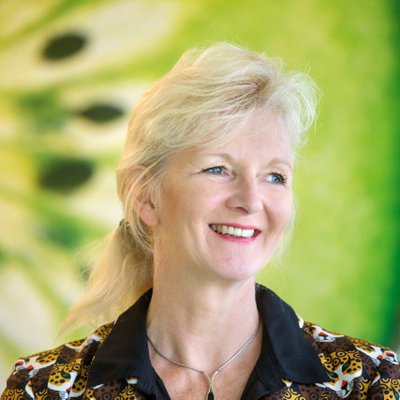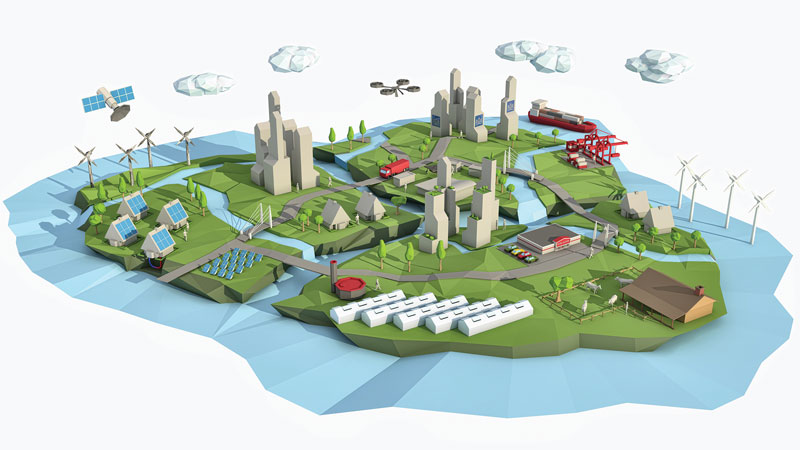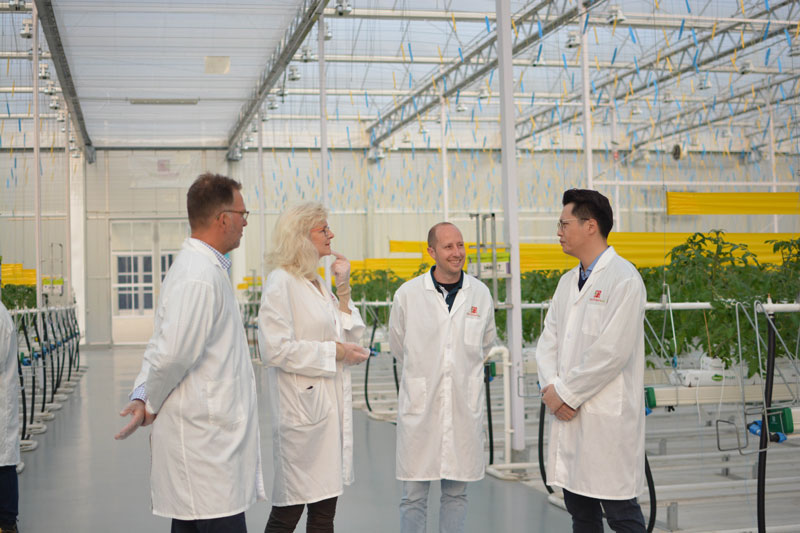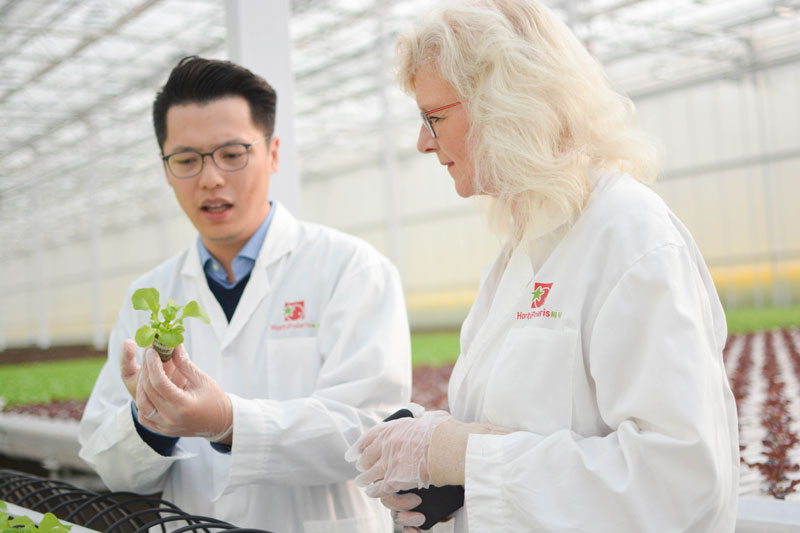Meiny Prins:
Key Points For a Beautiful World & Future
- Disruptive technologies – to move ahead and find true success we need to create more and more technologies that disrupt the market – think Uber, Fin Tech, artificial intelligence, climate controlled food bowls integrated within the urbanised areas in cities
- Create a reliable climate for growth with well-controlled automated systems
- Smart Technology is the future, we must embrace it, automation
- Sustainability – We must change the way we think and the way we grow food, using less natural resources and creating more profitability – this is the heart of true sustainability
- Embracing artificial intelligence and data services
——————–
Innovation, Disruptive Technologies & Sustainable Urban Deltas
By RAQUEL NEOFIT
The words, ‘disruptive technology’, are two we are hearing a lot lately from industry leaders, and Meiny Prins, is among them.
The general idea is that we need to find a technology that will disrupt our respective market to ensure success.
But Meiny Prins also has a personal mission to make the world more beautiful, together! And she is captivating!
Meiny Prins is CEO and one of two Board Directors of Priva. She is known as the ‘Pri’ in ‘Priva’.
In The Netherlands, Priva’s home country, almost fifty percent of their business is about building automation followed closely by their success in greenhouse and horticultural automation.
All of which is about climate control: large buildings, difficult environmental conditions, and energy and water savings within an integrated system.
The Priva hallmark worldwide now is creating environments in which people and plants can experience the best way to grow, using modern services and technologies for automated systems.
At the 2018 Hydroponic Farmers Federation conference, along with a room full of people, I listened intently to her speak for over 45 minutes, and once she finished the room erupted into applause. I’m sure I wasn’t the only one who could have listened to her talk for hours.
Dedicated to sustainability, innovation, and internationalisation, Meiny is an inspiring bridge connecting companies, governments and sectors throughout the world.
She questions why they do what they do and challenges them to make the world a better place through sustainable practices and smart technological advances.
SUSTAINABLE URBAN DELTA INITIATIVE
In 2014, Meiny launched the ‘Sustainable Urban Delta’ initiative, which showcases how many of the solutions that we need are already available to solve the problems faced by cities throughout the world: solutions for water, food, energy, and mobility.
Meiny’s talk on Sustainable Urban Deltas wasn’t just inspiring it also makes a lot of sense.
‘People want change,’ Meiny said. ‘That’s where it starts. It will be difficult due to the existing systems we maintain, but people themselves will be making all those major breakthroughs possible as they will be the ones adopting all the available, affordable and user-friendly technology en masse. It will become easier and easier to solve complex problems collaboratively.’ she added.
Meiny is convinced that we are just in time to turn around the disastrous consequences of our old economy on the quality of life on our planet.
From a technological point of view, we could solve it today. The fact that we can’t change now – or don’t want to – is really down to ourselves.
For instance, with all our subsidies for agriculture and fossil fuels, we maintain systems that are good for the profits of the largest companies on our planet but aren’t good for our own well-being. And all that will be stripped away!
Whether people want it or not, things will change.
She went on to talk about places like Beijing, Mexico, and Qatar.
‘For example, Beijing is growing her city towards the 6th Ring Road (expressway). Formerly the small farm villages in the green belts around the city were simply demolished.”
“But instead of replacing these villages for modern buildings, they’re now looking to new ways to integrate these green belts into urbanised areas,’ she says.
Some of these governments are even enforcing major property developers to invest in food belts around their cities. One developer wanted to build 30 apartment towers in a large city she tells us, so the government agreed on the condition that the developers also would invest in the green belt around the city.
‘Cities will be green, circular, and low carbon, even if your government is not ready to make the changes that are needed to sustain our environments, it’s your voice that will bring about this change, and cities will change!’ she said.
‘They will be the drivers of sustainability; the new technology of the next age, and it will happen,’ she added assuredly.
It’s an idyllic outlook that could really change the state of our environment and our future. The opportunities for indoor farming, be it under glass or plastic or even inside buildings, and sectors like aquaponics are assuredly on the rise, and it’s not too late to find your own niche within these sectors. But we must be prepared to embrace technological advances to survive.
Another area Meiny touched on as a very important advancement in these sustainably-driven environments is creating ‘a new sexy environment where the younger generation want to work.’
Our new generation is learning in high-tech surroundings so leaders and developers have begun thinking outside of the box and looking at ways they can make our industry more high-tech, with improved infrastructure, including better use of utilities like electricity and clean water.
‘Instead of destroying the areas they’re looking to new ways to grow and live,’ Meiny said.
Business models are changing and they are coming from a different angle than we’ve ever seen before.
Integrated solutions aren’t just about growing tomatoes on the roof she says, it’s the entire integrated system, aquaponics on the 7th floor, hydroponics on 8th, a communal kitchen on the 5th.
These type of developments does something with neighbourhoods in especially lower socioeconomic situations, it is giving back to the people and community, giving them not only a local marketplace but also employment opportunities, developing small businesses in and around such places, creating social coherence. It does something with the value of the whole neighbourhood, with real estate. And it is ensuring sustainability!
There are completely self-sustaining communities being built at this moment in some parts of the world, places where wastewater from the cities is being re-used for food production and where different heat sources of different users are interchanged with each other to optimize every one’s energy usage.
‘So, this is the beginning of a total change in the whole horticulture industry. In the end, people will create different business models with all kinds of integrated business solutions and it will be based on the very cheap and available technology we already have available to us,’ Meiny said.
‘The urban farm movement is growing,’ Meiny says. ‘If you look all over the world at this moment covered greenhouses are being constructed, it doesn’t matter where you go; whether it’s the heightened greenhouses in Japan, solar greenhouses in China, or multispan greenhouses in Mexico; innovation is everywhere. Indoor farming, rooftop farming, greenhouse farming, everywhere in the world we are training and educating people,’ she said. ‘And we’re just beginning, can you imagine, from soil to heightened greenhouses that can be altered according to the food production?’
To close, Meiny said, ‘I believe that this integrated technology will come just in time for us to live in a better world together for our future together, be connected, and stay together, and build together, in these new sustainable urban deltas.’
priva.nl
sustainableurbandelta.com
 Meiny Prins, Priva
Meiny Prins, Priva
Keynote Speaker
Costa PCA Conference 2019
The Star Gold Coast, Queensland
July 7 – 10th 2019
Meiny Prins is CEO and co-owner of Priva. In this position, she was proclaimed Business Woman of the Year 2009 and received the first CleanTech Star of WWF (World Wildlife Fund) for Priva.
Priva is a high-tech company that develops hardware, software and services in the field of climate control, energy saving and optimal reuse of water. Priva’s market covers the fields of horticulture, indoor and city farming, and utility buildings such as offices, retail, hotels and hospitals.
Meiny devotes a great part of her life to promoting sustainability, innovation and internationalisation.
She is a much sought-after authority in this field. With her clear, inspirational message on sustainability, she bridges the divide between companies, governments and sectors.
What does your business look like in 2025?
Whether people want it or not, things will change. We are witnessing three major trends at this moment that makes the shift happen.
It is about adding value, available and affordable technology and ‘the city’ that will force us into a sustainable world. Just in time to turn around the disastrous environmental consequences of our old economy.
Meiny claims that local food production is becoming an inspiring an important part of being able to realise the circular economy.
www.pca2019.com

Sustainable Urban Delta’s – Our vision of the world, reflected in our choices, our ambition, and in our identity.
Priva – Creating a Climate for growth.

Meiny Prins of Priva in a greenhouse in China

Meiny Prins of Priva in a greenhouse in China
